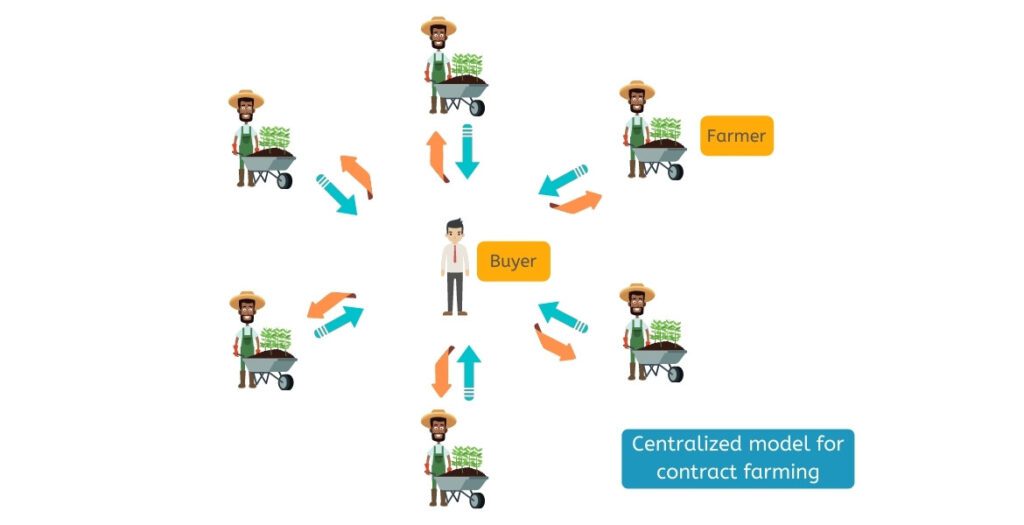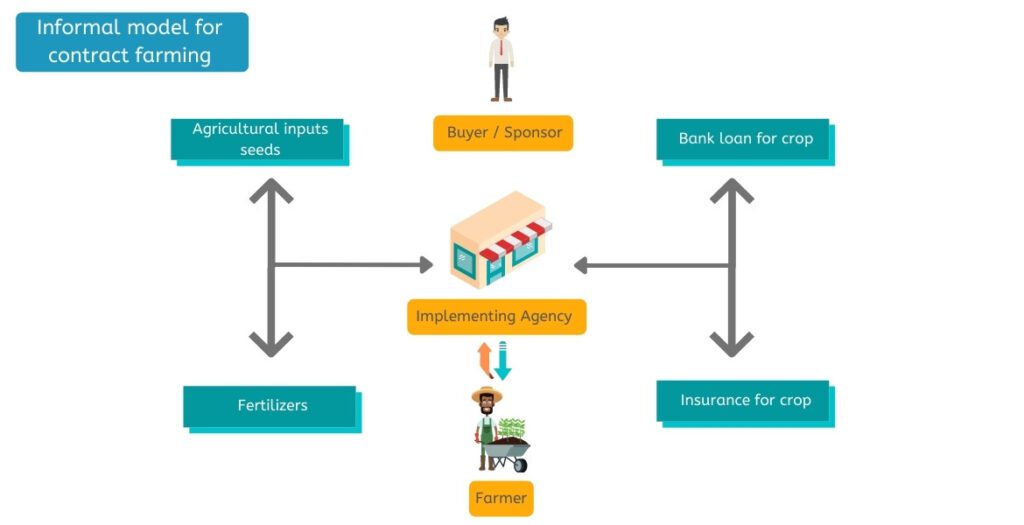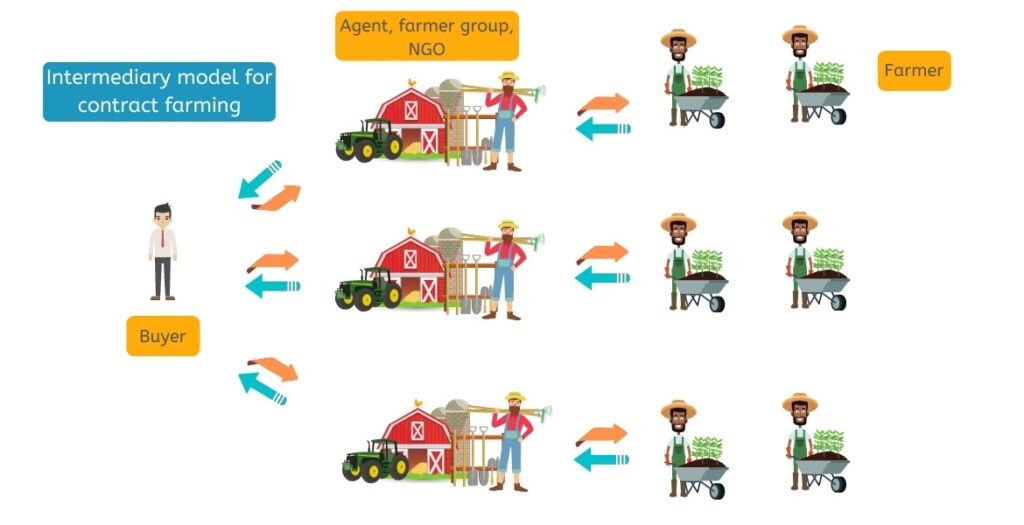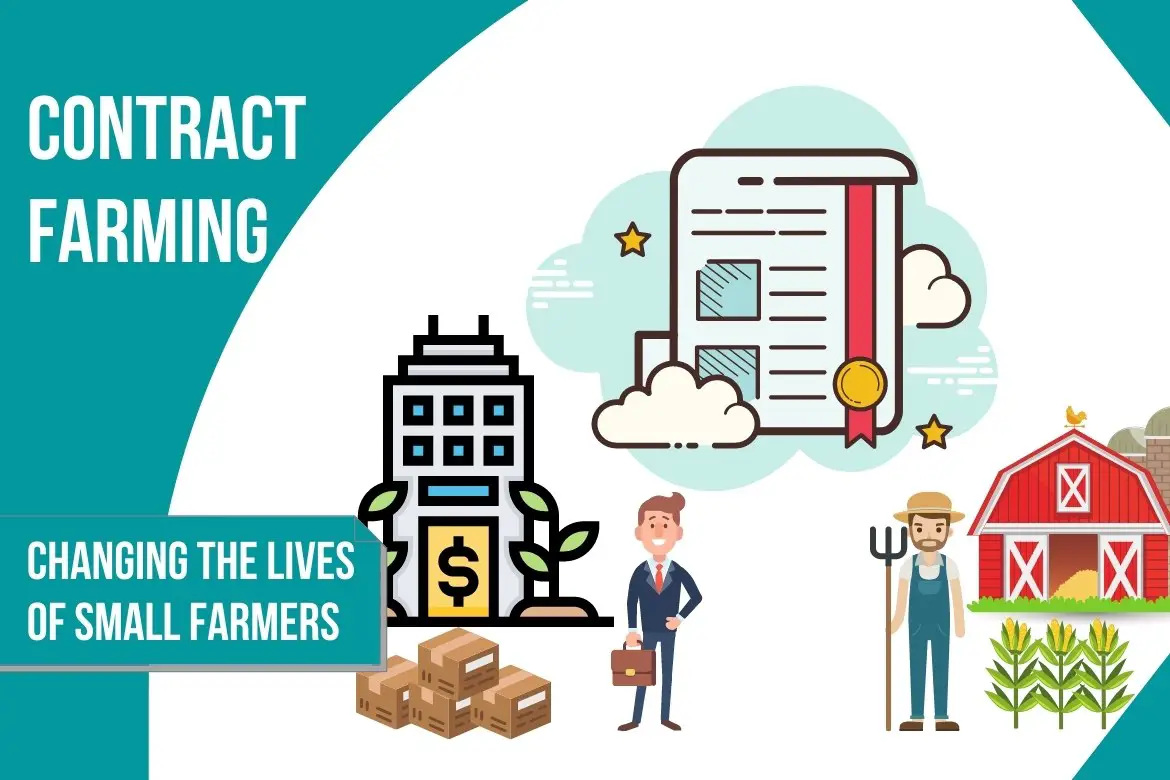Table of Contents
Introduction
The issue of commodification of lands and privatizing them has been discussed for some time now. There have been a number of projects related to agricultural improvement that emphasize the eradication of traditional farming methods and the adoption of new methods and programs such as contract farming.
This article discusses how farmers can increase their income with private contracts while at the same time “retaining their land”.
Contract Farming
What is contract farming ?
According to the FAO, a contract farming arrangement is a pact between farmers and processing/marketing firms to produce and sell agricultural products under a forward arrangement. These arrangements are generally based on prices that are predetermined.
Furthermore, the purchaser firm is typically required to provide some degree of production support, such as supplying inputs and offering technical advice.
Cooperation to reduce uncertainty in production, essentially one person (or firm) promising to supply output to another person (or firm) promising to buy according to agreed terms often over a period of time.
Such arrangements are based on :
- An agreement between a farmer and a firm whereby the farmer agrees to provide a specific commodity in quantities and at quality standards decided by the firm.
AND
- Commitment by the firm to purchase the commodity (at a predetermined price irrespective of the market fluctuation) and support the farmer’s production.
Different models of contract farming
Following are some of the contract farming models in India.
1 . Centralized model
Farmers receive support from the contracting company in order to produce the required crops. The contracting firm is closely associated with the farmer for quality control of the crop. Firms buy the crops from farmers and then package and market them.

Except in a limited number of cases, farmer quotas are normally distributed at the beginning of each growing season and quality is tightly controlled

In developing countries, this type of farming is quite popular for crops such as tobacco, cotton, bananas, coffee, tea, cocoa, and rubber. However, this model can also be applied to poultry, pork and dairy production.
In the case of fresh vegetables and fruits grown under contract, “processing” may include grading, sorting, packaging, as well as providing cool storage facilities.
2 . Nucleus estate model
This is a variation of the centralized model. Sponsors of these projects typically own and manage estate plantations, which are usually close to the processing plant.
Firm owns and manages as estate plantation to ensure the guarantee of required output. For trees such as palm oil and fresh vegetables that are exported abroad, this model of contract farming is primarily used.
The estate is often fairly large in order to provide some guarantee of throughput for the plant, but on occasion it can be relatively small, primarily serving as a trial and demonstration farm.
A common approach is for the sponsors to commence with a pilot estate then, after a trial period, introduce to farmers (sometimes called “satellite” growers) the technology and management techniques of the particular crops
Although no longer developing these estates, the British based Commonwealth Development Corporation (CDC) pioneered the nucleus estate model.
As an example, oil palm and other crops have been planted on Nucleus estates in Indonesia and Papua New Guinea, as part of resettlement and transmigration schemes.
3 . Multipartite model
Multipartite models typically involve statutory bodies, private companies, and farmers working together. Separate organizations may be involved in credit provision, production, management, and processing and marketing in multipartite contract farming.
In Mexico, Kenya and West Africa, among other countries, governments have directly instead in contract farming through joint ventures with the private sectors
According to the figure below, the county branches implemented and maintained the terms of the contract, through the assistance of their agronomists and field technicians. A formal contract existed between the joint venture and the branches. The village committees had written agreements with the countries. However, the farmers’ relationship to their respective committees was only verbal.

4 . Informal model
Most of the time, they are small businesses that enter into informal contracts with farmers on a seasonal basis, which usually include fresh vegetables and tropical fruits.

This model applies to individual entrepreneurs or small companies who normally make simple, informal production contracts with farmers on a seasonal basis, particularly for crops such as fresh vegetables, watermelons and tropical fruits
The crops are usually processed minimally. Technical advice is usually limited to matters of grading and quality control, with materials inputs usually restricted to seeds and various fertilizer.
A common example of the informal model is where the sponsor, after purchasing the crop, simply grades and packages it for resale to the retail trade.
Often, supermarkets purchase fresh produce directly from farmers or from individual developers. These developers generally invest little money into the process.
This is the most transient and speculative of all contract-farming models, with risk of default by both the promoter and the farmer. Nevertheless, in many developing countries such developers are individual developers
5. The Intermediary (tripartite) Model

Using this model, companies subcontract the production of crops to intermediaries (such as agents, farmers groups, or NGOs).
To fulfill the obligations under formal contracts with corporations, intermediaries normally enter into informal contracts with farmers. This model is commonly observed in south-east Asia.
This model also characterized by the possibility of danger that the sponsor loses control of production and quality as well as prices received by farmers
Examples of contracting farming in different states of India
Following are some of the examples of firms practicing contract farming in different states of India. Source : Satish, 2012, Kadrolkar, 2016
Contract farming in Punjab
Firm Crop
NIJJER Agro Foods Ltd. Tomato and Chilli
United Breweries Ltd. Barley
PepsiCo India Ltd. Basmati, Groundnut, Potato and Chilli
Nestle India Ltd. Milk
Satnam Oversease, Sukhjit Starch Basmati and Maize
Satnam Oversease, Amira Indian Foods Ltd. Basmati
Contract farming in Madhya Pradesh
Firm Crop
Cargil India Ltd. Wheat, Maize and Soybean
Hindustan Lever Ltd. Wheat
Ion Exchange Enviro Farms Ltd. Several Fruits, Vegetables, Cereals and Pulses
ITC Soybean
Contract farming in Maharashtra
Firm Crop
Tinna Oil and Chemicals Wheat, Maize and Soybean
Ion Exchange Enviro Farms Ltd. Wheat
Contract farming in Karnataka
Firm Crop
Himalaya Healthcare Ltd. Ashwagandha
Mysore S N C Oil Co. Dhavana
AVT Naturals Products Ltd. Marigold and Caprica Chilli
Natural Remedies Pvt. Ltd. Coleus
20 Pvt. Co. Gherkins
Contract farming in Tamil Nadu
Firm Crop
Super Spinning 570 Mills Cotton
Appachi Co Cotton
Bhuvi Care Pvt. Ltd. Maize and Paddy
Advantages of contract farming for farmers
It is advantageous to contract farm to farmer because the sponsor can purchase all products grown, provided they meet certain quantities and quality requirements. Also, contracts provide farmers with access to a variety of managerial, technical, and extension service.
1 . Enhancement of inputs and services related to production
Inputs such as fertilizer and seeds are also part of the supply chain. Sponsors may also provide free training and extension services to the farmers, as well as land preparation, field cultivation, and harvesting.
2 . Ease of getting credit
In some cases, contract farming allows farmers to receive some type of credit to finance production inputs. Crop loans that are guaranteed by the sponsor can also be arranged with commercial banks and government agencies.
3 . Utilization of better technology
Private agribusiness has a direct economic interest in improving farmers’ production. It usually provides technology with more care than government agricultural extension services.
4 . Farmer skill improvement
By following the extension service’s strict timetable, farmers will gain practical experience in conducting field activities. Farmers can apply these new skills (regarding seeds and fertilizers, pest and disease management and transplantation) to other cash crops to better their profit margins and livelihood.
5 . Price Guarantee
Farmers are able to set the price of the commodity according to their desires and market prices. Farmers have the ability to future proof their returns and profit by entering into a contract.
6 . Ease of access to reliable markets
Providing market guarantees to farmers and ensuring supply for traders is also one of the benefits of contract farming to farmers. Farms can benefit from contract farming even when there are already shops for similar crops.
Advantages of contract farming for firms/sponsors
1 . Better political acceptance
Politicians are less likely to criticize contract farming when the farmer is not a leaseholder of the sponsor. It is politically advantageous for a sponsor or firm to involve smallholder farmers in production instead of owning and controlling the whole plantation.
2 . Overcoming land restriction barriers
At present, the majority of large tracts of suitable land are either traditionally owned, very expensive to acquire or not available for commercial development. Contract farming, therefore, allows the sponsor firm to operate in these lands without the need to purchase the expensive land.
3 . Shared risk and Consistency in production
As a result of partnering with contracted farmers, sponsors are able to share the risk of production failure due to poor weather, disease, etc.
4 . Assurance of quality
A reliable quality standard is essential for sustaining markets for fresh and processed agricultural products. By managing and regulating the quality of the products together with the farmers, the sponsor firm is able to assure that the quality of the product is on par with the market standards.
Problems of contract farming
1 . Potential for greater risk
In order to prepare themselves for the possibility of higher returns, farmers considering contract farming should weigh the possibility of higher risk. A lack of prior field testing can lead to lower-than-expected yields for farmers, especially when prior field testing is inadequate. Additionally, market risks can also occur if the sponsor firm makes incorrect forecasts of market size or price levels
2 . Crop incongruity and new technology risk
Introduced under special conditions controlled by the sponsor, a new crop would disturb the current farming system. On the flip side, a loss of local employment and over capitalization of contracted farmers might result from the introduction of advanced farming technologies.
3 . Sponsor lack of management skills
Management incompetence can cause production to exceed its original goals. For example, mismanagement of transplantation may lead to over planting. Another example of the lack of skills of a sponsor can be that a sponsor can have unrealistic expectations about the market for their product.
4 . Corruption in the system
Employees who are responsible for issuing contracts and purchasing crops often take advantage of their positions. Furthermore, a sponsor can be dishonest or a farmer can give false promises and be lazy. Generally, the sponsor should secure access to land for a minimum period of time before signing a contract.
5 . Cultural and social restrictions
If customs and traditions play a large role in a community, there may be difficulty introducing innovative farming techniques. Sponsors should, therefore, consider both the social attitudes and the traditional farming practices of communities before introducing a new crop.
6 . Sub-standard agricultural inputs
The farmer is likely to continue using substandard agricultural inputs even after entering into the contract. This could be due to the farmers’ habits or lack of knowledge of new trends or their desire to increase their profits. Input diversion is usually more of a nuisance than a problem.
7 . Crops sold by farmers beyond their contractual obligations
Farmers who are not contracted try and sell their crops to established sponsors by unethical means. The non-contracted crops of their friends and relatives are introduced into the contracted crop by farmers with crop contracts. Because of such practices, a sponsor might find it difficult to make quality assurances or regulate production goals.

